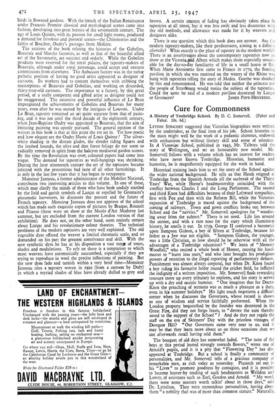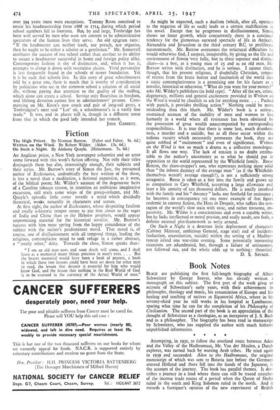Cure for Commonness
A History of Tonbridge School. By D. C. Somervell. (Faber and Faber. 10s. 6d.)
LYrrom STRACHEY suggested that Victorian biographies were written by the undertaker, as the final item of his job. School histories in the main might well be the work of a pedantic alumnus, endowed with enthusiasm but without literary skill and sense of selection. In A Viotrnian School, published in 1943, Mr. Talboys told the story of Wellington, and set an honourable new model. Mr. Somervell follows With a volume which has an interest for readers who have never known Tonbridge. Historian, humanist and humorist, he is magnificently equipped for the work in hand.
Historical training leads him to set the story of the School against the wider national background. He tells us that Hatch reigned at Tonbridge from the Spanish Armada till the outbreak of the Thirty Years' War, while Horne's headmastership coincided with the conflict between Charles I and the Long Parliament. The second and third Knox had difficulties because of their Leftward sympathies, first with Fox and then with the Reform Bill, while the Victorian expansion of Tonbridge is traced against the background of the coining of railways. Town and gown conflicts broke out between School and the " navvies." Mr. Somervell apologises for " wander- ing away from the subject." There is no need. Life lies around the corner, and with a rare nose for the story which illuminatep history, he smells it out. In 1759, George II conferred a baronetcy upon Sampson Gideon, a boy of fifteen at Tonbridge, because his father as a Jew was not eligible. " Sampson Gideon, the younger, was a little Christian, as how should he be otherwise with all the advantages of a Tonbridge education? " We learn of " Memory Woocifall," who recited a whole book of Homer, causing his head- master to " burst into tears," and who later brought his prodigious powers of retention to the illegal reporting of parliamentary debates. Punishment was almost always corporal, but when Dr. Knox found a boy riding his favourite heifer round the cricket field, he inflicted the indignity of a written imposition. Mr. Somervell finds rewarding treasure trove up every tributary he explores, and his story is served up with a dry and caustic humour. " One imagines that for Doctor Knox the preaching of sermons was as much a pleasure as a duty, even in his summer'holidays." His light touch negotiatei a difficult corner when he discusses the Governors, whose record is shown as one of wisdom and service faithfully performed. When the London property bequeathed by the founder was destroyed in the Great Fire, did they not forgo feasts, to "devote the sum thereby saved to the support of the School " ? And do they not regale the staff on the eve . of Skinners' Day with the priceless vintages of Dowgate Hill? "Our Governors came very near to us, and it may be that they learn more about us on those occasions than we can afterwards recall having told them."
The bouquet of old days has somewhat faded. " The taste of the boys at this period leaned strongly towards flowers," wrote one of Arnold's pupils, and it is a pity that " Flowering Day " has dis- appeared at Tonbridge. But a school is finally a community of personalities, and Mr. Somervell tells of a gracious company of remarkable men, as rich today as yesterday. Plutarch set out in his " Lives " to promote goodness by contagion, and it is possible to become braveriby reading of such headmasters as Welldon and Lowry, of assistants such as Earl, Gordon and Arnold. " My word, there were some masters worth talkin' about in those days," said Dr. Lyttelton. They were tremendous personalities, having about them a nobility that was of more than common stature." Naturally,
over 394 years there were exceptions. Tommy Roots contrived to retain his headmastership from 1668 to 1714, during which period school numbers fell to fourteen. Butt by and large, Tonbridge has been well served by men who were not content to be administrative spectators of the human lives they serve. An old epigram runs : " If the headmaster can neither teach, nor preach, nor organise, then he ought to be either a scholar or a gentleman." Mr. Somervell attributes the success of one school rather than another to its ability to secure a headmaster successful in home and foreign policy alike. Contemporary fashion is shy of distinction, and, when it has it, attempts to clamp it down with restrictive chains. Vivid personality is less frequently found in the schools of newer foundation. Yet it is by such that schools live. In this story of great schoolmasters told by a great one, there is much that is worthy of consideration by politicians who see in the common school a solution of all social ills, without paying due attention to the quality of the staffing, which alone can create a school. Service only flourishes in freedom, and lifelong devotion cannot live in administrators' prisons. Com- menting on Mr. Knox's new coach and pair of long-tail greys, a Tonbridgian's aunt said " Lor'sir, a schoolmaster's is a vastly fine trade." It was, and in places still is, though in a different sense from that in which the good lady intended her remark.
JOHN GARRETT.



































 Previous page
Previous page